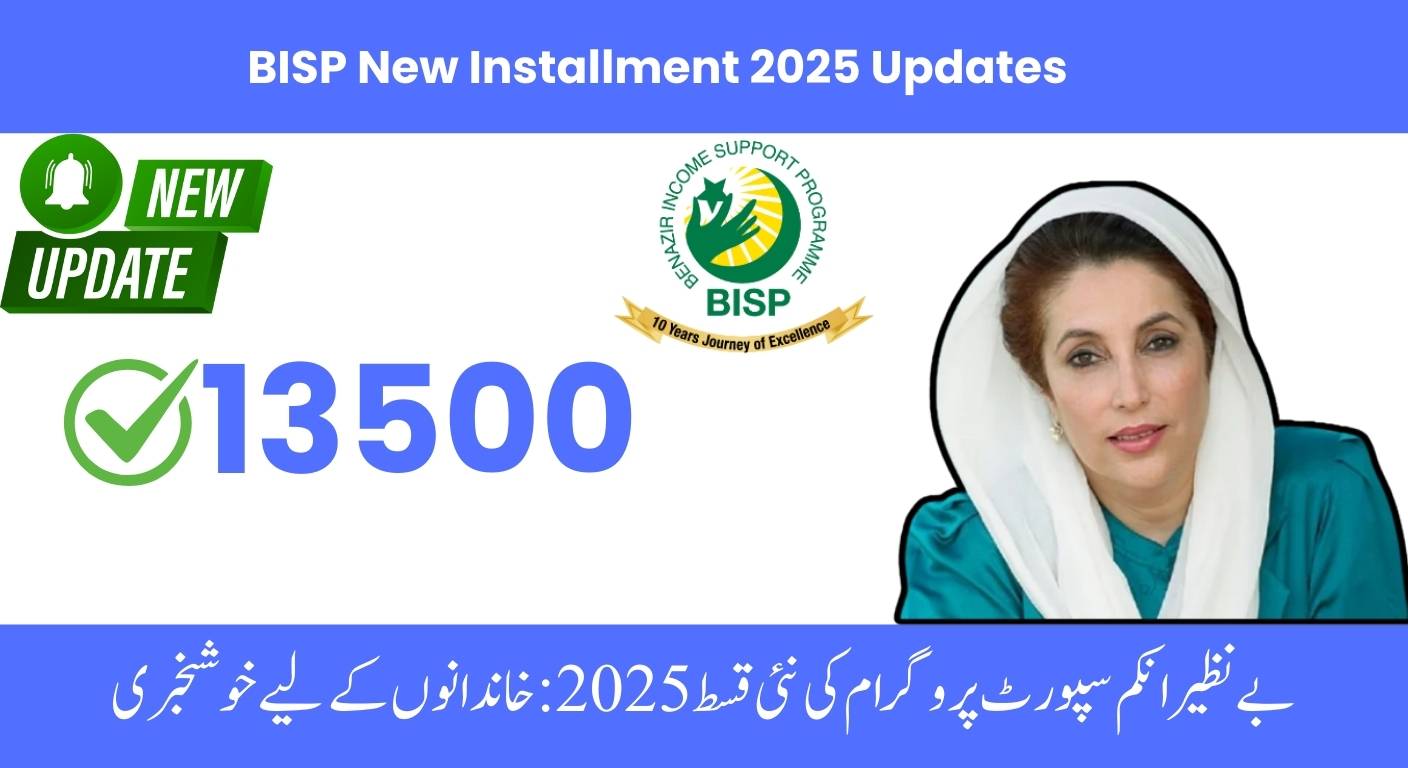The Benazir Income Support Programme (BISP) is Pakistan’s biggest social safety net. It helps poor and vulnerable families, especially women / households headed by women, by giving them money regularly. In 2025, there are several important updates about BISP payments, eligibility, and changes. This article explains what you need to know.
What is New in 2025
- Installment Increase
BISP’s quarterly installment is now Rs. 13,500. Before this, the amount was lower (for example, Rs. 10,500 in earlier cycles). - Payment Schedule for September 2025
The next installment of Rs. 13,500 is set to be released starting 10 September 2025. - New Payment System & Digital Wallets
BISP is launching a new payment system to make payments easier and safer. One key change is that beneficiaries will be able to receive funds directly to bank accounts.
There is also talk of digital wallet options being introduced, which would allow more flexible payment receiving via mobile/digital means. - Pilot / Phased Roll-Out
The new system will start with a pilot phase in some major cities (like Karachi, Lahore, Quetta, Gilgit, Muzaffarabad, Peshawar) from about 13 August 2025. - Eligibility & Verification
To receive payments, women must be registered with BISP (Benazir Kafalat / 8171 programme). The National Socio-Economic Registry (NSER) or dynamic / poverty survey must be up to date. Their CNIC must be valid, not expired or blocked. - How to Check Payment Status
Beneficiaries can check whether their installment is ready by sending their CNIC number to 8171 (SMS), or by using the official 8171 web portal. Also, BISP offices or campsites can help with verification. - Payment Collection Points
The payments are distributed through dedicated BISP payment centres, campsites, banks / partner agents. Biometric verification is often required. Recipients are advised to bring their original CNIC and follow scheduled dates to avoid confusion.
Why These Changes Matter
- Financial Relief with Inflation
Prices of food, electricity, gas, and other essentials have gone up. Increasing the installment to Rs. 13,500 helps poorer households cope. - Transparency and Efficiency
The new payment system and digital wallet options aim to reduce delays, avoid long queues, and lessen problems like wrong deductions or fraud. - Inclusivity for New Beneficiaries
By including newly eligible women who complete registration or verification, more people can benefit. The phased rollout ensures smoother implementation.
Important Dates & What Beneficiaries Should Do
| What | Date / Window |
|---|---|
| Pilot phase of new payment system begins | ~13 August 2025 in selected cities |
| Next Rs. 13,500 installment release | 10 September 2025 |
| Payments may be in phases by district/area | Depending on local schedule after 10 September |
What you should do if you are a beneficiary:
- Make sure your CNIC is valid and active. Renew it if expired.
- Confirm your registration / survey status (NSER). If your data is old or you missed the dynamic survey, contact BISP.
- Use official channels to check your payment: SMS to 8171 or via the official portal.
- Go to the assigned payment centre or bank / agent on the correct date. Bring original CNIC.
- If there is any issue (no payment, wrong amount, deduction, blocked CNIC, etc.), use the BISP helpline or visit your nearest BISP office.
Challenges & Things Beneficiaries Should Be Careful About
- Delays or Confusion by District: Because payments are released in phases by district, some areas may get the installment later. Beneficiaries need to monitor their own district schedule.
- Fraud / Fake Messages: False news, fake SMS, or fake websites sometimes circulate. Beneficiaries must only trust official sources (BISP website, SMS 8171, government announcements).
- Biometric and Verification Issues: Sometimes fingerprint/biometric systems fail or there is mismatch in identity. These cases may delay payments. Beneficiaries should follow instructions from BISP to resolve issues.
- Access Issues: For remote or rural areas, reaching payment centres can be difficult. The new plan with more centres and digital wallets may reduce these difficulties in future.
What the Government Says
- BISP leadership, including Chairperson Senator Rubina Khalid, has announced the plan to make payments more transparent, to reduce leakages and errors.
- The aim is to ensure poor households—especially women—get their entitlement fully, without deductions or undue delays.
Conclusion
In 2025, BISP is making important changes:
- The installment has been increased to Rs. 13,500, providing greater support.
- New payment systems (bank transfers, digital wallets) are being introduced.
- A pilot started in August, and the next quarterly payment is scheduled from 10 September 2025.

